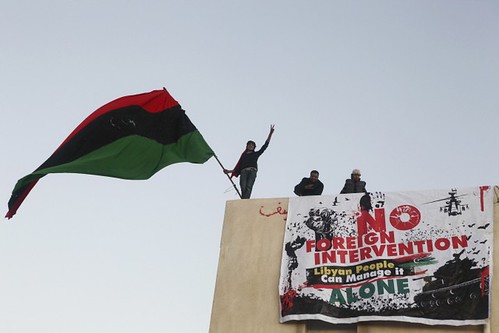
"Hands Off Libya! Libyan people can manage it alone!" Photo by Al Jazzera/Flickr.
Al-Hurra Arabic-language television invited me today to comment on African government reactions to events in Libya.
The interviewer was actually much more interested in the role of African mercenaries than African governments. After commenting that there clearly are some African mercenaries fighting for Colonel Qadhafi, I suggested the accounts are probably exaggerated and we will not have a good idea of the numbers involved until after the conflict is over. More important than the number in Libya today is whether new mercenaries are arriving. There are unconfirmed reports that the government of Zimbabwe has allowed members of its military forces to go to Libya as mercenaries. When members of parliament asked Zimbabwe Defense Minister Emmerson Mnangagwa about these reports, he did not respond directly to the question.
What I really wanted to talk about was the role of African governments. I was able to make a few of the following points:
- Most of Africa's 53 governments have been silent on events in Libya. Some are concerned that if they criticize Qadhafi, it may endanger their nationals who have not been able to get out of Libya. Certain authoritarian governments are probably reluctant to speak out for fear that such statements will only encourage reformers in their own countries.
- The response from those African governments that have commented on Libya runs the spectrum from concern to the breaking of diplomatic relations. Senior officials in Mauritania, Morocco, South Africa, Lesotho and Sudan have expressed concern or deep regret about the violence in Libya. The governments of Liberia and Mozambique condemned the violence. The president of Gambia called on Qadhafi to step down immediately. Botswana not only condemned the violence but broke diplomatic relations with Libya.
- The position of the African Union (AU) has been especially disappointing. So far, it has taken no action. Qadhafi has been a major financial supporter of the AU and this fact may reflect its failure to respond. Should Qadhafi survive, the AU may be concerned that he will cut off future funding. The current AU Chairman is Equatorial Guinea's Teodoro Obiang Nguema Mbasogo, not an African leader at the forefront of political reform. While the Arab League has suspended Libya's membership, the AU dithers.
- Finally, it will be interesting to see what happens to Qadhafi's Community of Sahel-Saharan States (CEN-SAD). At last count it had 29 African members and has the stated goal of strengthening peace, security, stability and economic development among member states. It is also Qadhafi's effort to create an organization that he hoped would lead one day to the United States of Africa. That concept never had much traction; it has now probably slipped into the ditch.



